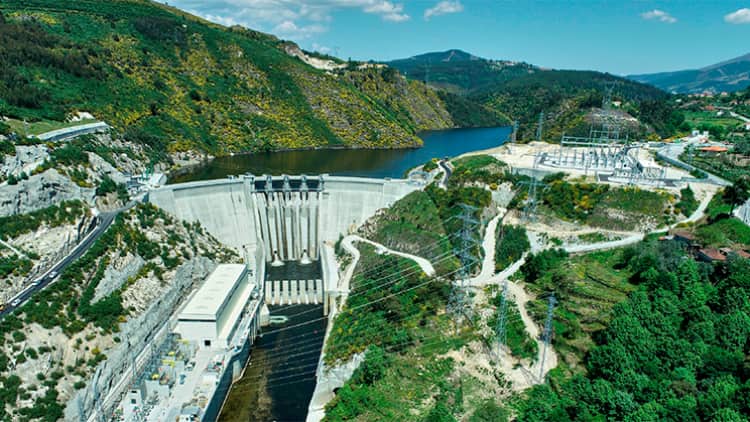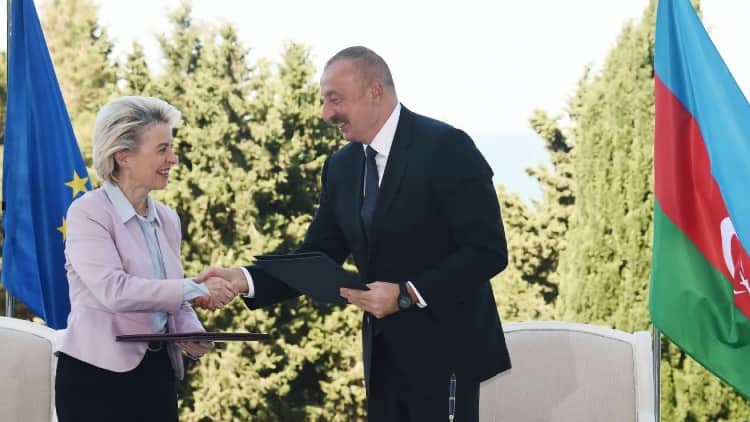The Diplomat
The Chairman of Iberdrola, Ignacio Sánchez Galán, together with the Portuguese Prime Minister, António Costa, yesterday inaugurated the Tamega Gigabattery, which, with an investment of more than 1.5 billion euros, has become the largest clean energy project in the history of Portugal and one of the largest of its kind in Europe.
Iberdrola is thus accelerating its commitment to renewables in the neighbouring country, boosting its investments in the coming years with an additional 3,000 million euros to grow in wind and solar, according to Sánchez Galán, who highlighted the “environment of legal stability and good dialogue achieved by the Portuguese government in recent years”.
Furthermore, in the current context of the energy crisis in Europe due to tensions with Russia following the invasion of Ukraine, the chairman of the energy company stressed that this infrastructure demonstrates that “the two major goals” of energy policy, energy independence and decarbonisation, “are perfectly compatible as long as we work on the electrification of the economic and production system”, reports Europa Press.
Specifically, this investment effort in renewables of 3,000 million euros more will allow Iberdrola to advance in the promotion in Portugal of wind and solar power already under development or construction for up to 3,000 megawatts (MW), in a key market for the electricity company and where it battles for the ‘green’ leadership with the local EDP or Endesa.
Galán stressed that “the challenge” of energy independence and decarbonisation will require “huge investments in a complex” economic scenario, for which he thanked Costa for his “involvement” in enabling Portugal to have “a predictable planning and regulatory environment”, as well as “agility in the procedures” to address this growth in renewables.
Within this new boost to renewables in Portugal that Iberdrola will give, Galán framed the development of the 450 MW of wind power to be hybridised in this project in Támega and the development of another 2,500 MW of photovoltaic solar power throughout Portugal.
In addition, the chairman of the Spanish multinational pointed out Iberdrola’s commitment to the development of offshore wind power – in the Portuguese country, especially the floating navy – a technology in which the group is a world leader, and green hydrogen in Portugal. “The end of a journey is only the beginning of another journey,” said Galán, paraphrasing the Portuguese writer José Saramago in reference to the ambition of the electricity company in the country.
For his part, Portugal’s Prime Minister, António Costa, expressed his gratitude to Iberdrola as “a fundamental partner” in the development of renewables and assured that the energy company’s commitment to the country will be extended to floating offshore wind, where Portugal has an ambitious plan to develop capacity of at least 10 gigawatts (GW) by the end of the decade, and to green hydrogen.
Costa also stressed that Portugal’s commitment to renewables has allowed it to have “zero” dependence on Russia and underlined that the 17 billion euros paid over the years by Portuguese consumers in their bills to invest in renewables has now allowed them to enjoy this position.
“We are going to show solidarity, but solidarity also means that we are not going to make the Portuguese pay to make up for the backlog that others put themselves in when they could have made a 17 billion euro investment in renewables that we did,” he said.
The event, which was also attended by the Portuguese Minister for the Environment and Climate Action, Duarte Cordeiro; the Secretary of State for the Environment and Energy, Joao Galamba; and the presidents of the Municipal Chambers of Ribeira de Pena, Vila Pouca de Aguilar, Boticas, Chaves, Montalegre and Cabeceiras de Basto, served as the inauguration of this Támega hydroelectric storage ‘mega-works’, which has been under construction for almost eight years.
With a capacity of 1,158 MW, the Támega electro-production system is capable of storing 40 million kilowatt hours (KWh), equivalent to the energy consumed by 11 million people during 24 hours in their homes, making it one of the largest energy storage systems in Europe, according to estimates by the energy company.
The complex is made up of three power plants – Alto Támega, Daivoes and Gouvaes – and its pumping capacity allows it to store energy to be used when it is most needed, increasing the total installed electrical power in Portugal and avoiding the emission of 1.2 million tonnes of CO2 per year.
In addition, this engineering ‘mega-project’, on which several thousand people have worked, will avoid the importation of more than 160,000 tonnes of oil per year, consolidating itself as a socio-economic and job-creating driving force in the region.
In addition, the construction of the complex in this area of northern Portugal has been accompanied by an ambitious plan of social, cultural and environmental actions, benefiting seven municipalities, to which more than 50 million euros have been allocated.







